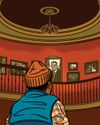
Sometimes, when Tucker Carlson is in the shower, he takes a quiet moment to reflect on whether his haters may be right about him. I know this not firsthand but because he recently mentioned it to a few thousand fans in Rosenberg, Texas. He said, "I have been through this process for so many years, where they call you something"-in his case, a very incomplete list would include "ven9966 omous demagogue," "crypto-Nazi blowhard," "anti-science ignoramus," and "a dick" "and I actually do try to take stock.
Like, am I that person?" These reveries always lead him to the same conclusion: he's clean. It is the haters who are wrong. That night, in Rosenberg, the epithet he lingered on was "extremist." He drew out the syllables in a derisive growl, followed by his foppish hyena bark of a laugh-a familiar sequence to anyone who has watched Tucker Carlson heap scorn on his enemies, which is to say, anyone who has watched Tucker Carlson. "Whatever else I am, I'm the opposite of an extremist," he continued. "My parents got divorced.
I'm totally opposed to change." He claims that his vision for the country's future is actually a vision of the country's past, one that strikes him as modest, even obvious: "I liked America in 1985." This was the ninth stop on the Tucker Carlson Live Tour-sixteen arenas, this fall, from Anaheim, California, to Sunrise, Florida, but mostly in the heartland.
At each stop, before bringing out his special guest (Kid Rock in Grand Rapids; Donald Trump, Jr., in Jacksonville), Carlson delivered a semi-improvised monologue, usually starting with some geotargeted pandering. In Michigan, he praised the local muskie fishing before slamming the state's "brain-dead robot" of a governor. In Pennsylvania, he extolled the beauty of the Conestoga River before describing that state's governor as "evil, actually." In Texas, he said, "There's something about being in a room full of people you agree with that is so great.
Esta historia es de la edición November 11, 2024 de The New Yorker.
Comience su prueba gratuita de Magzter GOLD de 7 días para acceder a miles de historias premium seleccionadas y a más de 9,000 revistas y periódicos.
Ya eres suscriptor ? Conectar
Esta historia es de la edición November 11, 2024 de The New Yorker.
Comience su prueba gratuita de Magzter GOLD de 7 días para acceder a miles de historias premium seleccionadas y a más de 9,000 revistas y periódicos.
Ya eres suscriptor? Conectar

Hatagaya Lore Bryan Washington
We moved to Tokyo from Dallas because of my husband's job, an unexplainable tech gig.

A MATTER OF FACTS
On the loss of two sons.

OPEN SECRET
Why did police let one of America's most prolific predators get away for so long?

BEYOND THE CURVE
In medicine and public health, we cling to universal benchmarks—at a cost.

Richard Brody on Pauline Kael's "Notes on Heart and Mind"
When Pauline Kael joined The New Yorker’s staff as a movie critic, in January, 1968, the world of cinema was undergoing drastic change.

CHORAL HISTORY
“The Alto Knights.”

THE ELEMENTS OF STYLE, 2025
Reliable news coverage has never been more important than it is now. Journalists must remain vigilant and rigorous in the face of a second Trump Administration. To help them do so, we are releasing an updated version of Strunk and White’s “Elements of Style.” Please refer to the following examples when writing and reporting, for as long as that’s still allowed.

CHARACTER STUDIES
“Purpose” on Broadway and “Vanya” downtown.

DO YOU KNOW JESUS?
Why the Gospel stories won’t stay dead and buried.

HOME SLICE
The making of an Indian American specialty.
